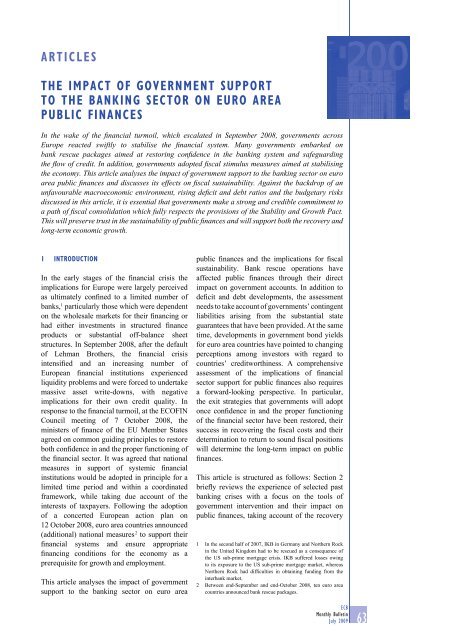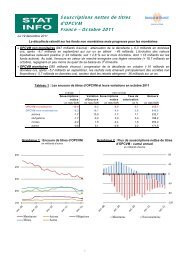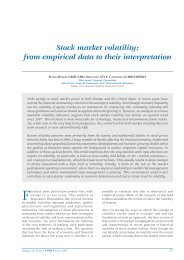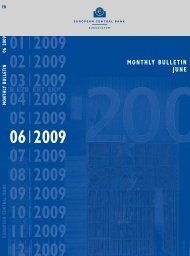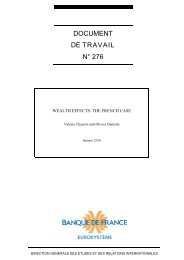Monthly Bulletin July 2009 - Banque de France
Monthly Bulletin July 2009 - Banque de France
Monthly Bulletin July 2009 - Banque de France
You also want an ePaper? Increase the reach of your titles
YUMPU automatically turns print PDFs into web optimized ePapers that Google loves.
ARTICLES<br />
THE IMPACT OF GOVERNMENT SUPPORT<br />
TO THE BANKING SECTOR ON EURO AREA<br />
PUBLIC FINANCES<br />
In the wake of the fi nancial turmoil, which escalated in September 2008, governments across<br />
Europe reacted swiftly to stabilise the fi nancial system. Many governments embarked on<br />
bank rescue packages aimed at restoring confi <strong>de</strong>nce in the banking system and safeguarding<br />
the fl ow of credit. In addition, governments adopted fi scal stimulus measures aimed at stabilising<br />
the economy. This article analyses the impact of government support to the banking sector on euro<br />
area public fi nances and discusses its effects on fi scal sustainability. Against the backdrop of an<br />
unfavourable macroeconomic environment, rising <strong>de</strong>fi cit and <strong>de</strong>bt ratios and the budgetary risks<br />
discussed in this article, it is essential that governments make a strong and credible commitment to<br />
a path of fiscal consolidation which fully respects the provisions of the Stability and Growth Pact.<br />
This will preserve trust in the sustainability of public fi nances and will support both the recovery and<br />
long-term economic growth.<br />
1 INTRODUCTION<br />
In the early stages of the financial crisis the<br />
implications for Europe were largely perceived<br />
as ultimately confined to a limited number of<br />
banks, 1 particularly those which were <strong>de</strong>pen<strong>de</strong>nt<br />
on the wholesale markets for their financing or<br />
had either investments in structured finance<br />
products or substantial off-balance sheet<br />
structures. In September 2008, after the <strong>de</strong>fault<br />
of Lehman Brothers, the financial crisis<br />
intensified and an increasing number of<br />
European financial institutions experienced<br />
liquidity problems and were forced to un<strong>de</strong>rtake<br />
massive asset write-downs, with negative<br />
implications for their own credit quality. In<br />
response to the financial turmoil, at the ECOFIN<br />
Council meeting of 7 October 2008, the<br />
ministers of finance of the EU Member States<br />
agreed on common guiding principles to restore<br />
both confi<strong>de</strong>nce in and the proper functioning of<br />
the financial sector. It was agreed that national<br />
measures in support of systemic financial<br />
institutions would be adopted in principle for a<br />
limited time period and within a coordinated<br />
framework, while taking due account of the<br />
interests of taxpayers. Following the adoption<br />
of a concerted European action plan on<br />
12 October 2008, euro area countries announced<br />
(additional) national measures 2 to support their<br />
financial systems and ensure appropriate<br />
financing conditions for the economy as a<br />
prerequisite for growth and employment.<br />
This article analyses the impact of government<br />
support to the banking sector on euro area<br />
public finances and the implications for fiscal<br />
sustainability. Bank rescue operations have<br />
affected public finances through their direct<br />
impact on government accounts. In addition to<br />
<strong>de</strong>ficit and <strong>de</strong>bt <strong>de</strong>velopments, the assessment<br />
needs to take account of governments’ contingent<br />
liabilities arising from the substantial state<br />
guarantees that have been provi<strong>de</strong>d. At the same<br />
time, <strong>de</strong>velopments in government bond yields<br />
for euro area countries have pointed to changing<br />
perceptions among investors with regard to<br />
countries’ creditworthiness. A comprehensive<br />
assessment of the implications of financial<br />
sector support for public finances also requires<br />
a forward-looking perspective. In particular,<br />
the exit strategies that governments will adopt<br />
once confi<strong>de</strong>nce in and the proper functioning<br />
of the financial sector have been restored, their<br />
success in recovering the fiscal costs and their<br />
<strong>de</strong>termination to return to sound fiscal positions<br />
will <strong>de</strong>termine the long-term impact on public<br />
finances.<br />
This article is structured as follows: Section 2<br />
briefly reviews the experience of selected past<br />
banking crises with a focus on the tools of<br />
government intervention and their impact on<br />
public finances, taking account of the recovery<br />
1 In the second half of 2007, IKB in Germany and Northern Rock<br />
in the United Kingdom had to be rescued as a consequence of<br />
the US sub-prime mortgage crisis. IKB suffered losses owing<br />
to its exposure to the US sub-prime mortgage market, whereas<br />
Northern Rock had difficulties in obtaining funding from the<br />
interbank market.<br />
2 Between end-September and end-October 2008, ten euro area<br />
countries announced bank rescue packages.<br />
ECB<br />
<strong>Monthly</strong> <strong>Bulletin</strong><br />
<strong>July</strong> <strong>2009</strong><br />
63


